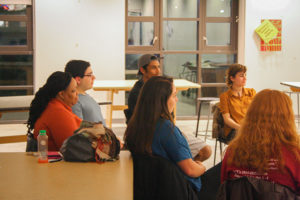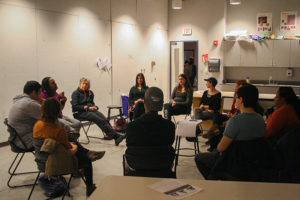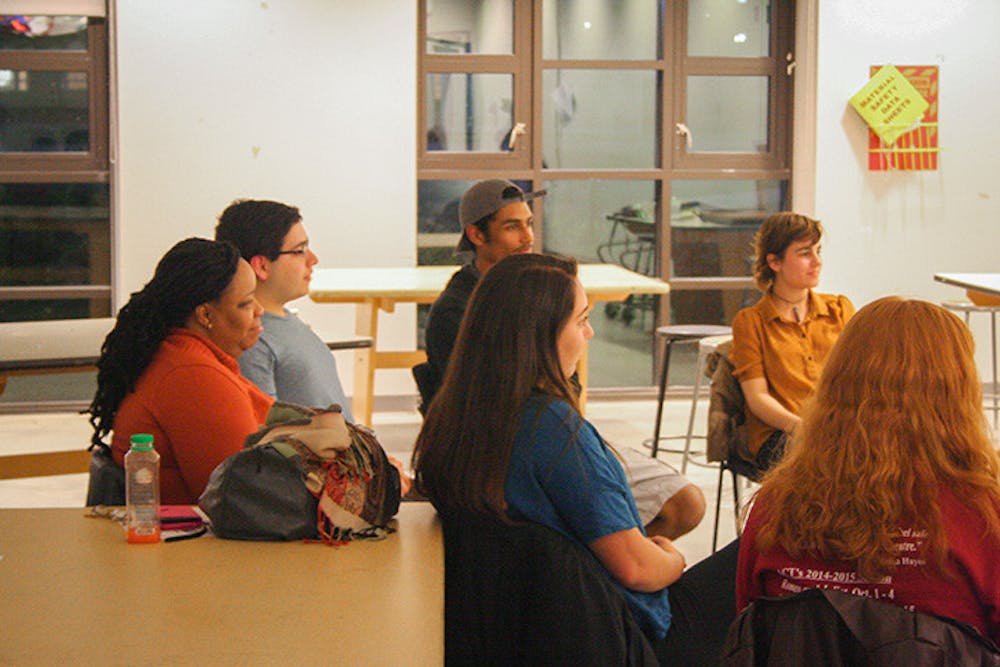By Jessica Bell
Correspondent
The mind is a highway full of moving vehicles, some speeding and some driving slowly. Each car represents a different experience, thought or feeling.
Nathalie Edmond, a clinical psychologist who led the second workshop in the “Activism 101 and 102 Series” on Wednesday, March 29, used a metaphor to describe the nature of the human mind.
“Mindfulness is being able to sit on the side of a highway, observing it all, but not getting into a particular car,” she said, citing Andy Puddicombe, the creator of Headspace, a meditation app, and the first to use the metaphor.
Edmond, who is also intensively trained in dialectical behavior therapy and cognitive behavior therapy, guided an intimate group of students and faculty through various meditation exercises.
The workshop, which was sponsored by the Office of Involvement and the School of Humanities and Social Sciences, linked the practice of mindfulness to activism to help those involved in social justice deal with the harsh emotions that are tied with making a change.
Edmond performed a love and kindness meditation exercise in which she asked participants to envision wishing well on those from both positive and negative relationships.

“People are often mean because they have suffered,” Edmond said. “When you embody love, it helps to soften anger and intense emotion.”
Edmond also discussed the concept of multiple truths, in that people have different viewpoints that sometimes cannot be changed. Still, Edmond said compassion is the best way to “call people in instead of calling them out.”
While there is no one viewpoint, there are also multiple attitudes in mindfulness.
Edmond opened a discussion about the different types of attitudes. The first is the practice of approaching every experience, no matter how mundane, as if it is a first experience. Noticing life and utilizing all five senses can allow individuals to better appreciate all interactions.
The second attitude revolves around human’s innate tendency to judge.
“We have a negative bias built into us for survival purposes,” Edmond said. “When we notice that we are forming judgments, we can (stop them from) being automatic.”
Edmond also spoke of equanimity, which follows the practice of staying grounded and not getting swept up in emotion.
“A lot of times people have these myths about mindfulness or meditation, that it is this idea that you have to control your mind or be totally Zen,” Edmond said. “Rather, mindfulness is just showing up and being curious about whatever arises — whether it be bliss, tension or nothingness.”
Ann Warner-Ault, a Spanish professor and interim assistant dean of the School of Humanities and Social Sciences, helped coordinate the workshop because she wanted to do her part for students at the College.
“I felt like (planning this event was) something small that I can do for the campus,” she said. “Even though I feel overwhelmed by a lot of what’s going on in the world, I feel very encouraged by (the College’s students).”
Senior political science major Katherine Wallentine was moved by the workshop.
“(Mindfulness) is a new way for me to interact with the world around me and to practice being grateful for the experiences I have,” she said. “Mindfulness has helped me let go of feelings of frustration and inadequacy, as well as loosen up the tensions in my body.”

Maureen Hudson, a senior elementary urban education and integrative-STEM double major, also stressed the connection between mindfulness and the human body.
“I believe the body is a highly politicized vehicle and our relationships with our bodies are informed by the heteronormative white supremacist capitalist patriarchy,” Hudson said. “Thus, I believe we all deserve to have a way of undoing this harmful view of ourselves and others. We deserve to be able to see our bodies as our own, worthy of love and care.”
Hudson, the former president of Circle of Compassion, used the practice of mindfulness to support her full recovery from an eating disorder.
“Mindfulness has helped me reshape my relationship with my body and come to love it as it is,” she said.
The workshop taught students that through self-care and active listening, it is possible to be adamant about social justice issues and help others while also helping themselves.
Edmond’s main piece of advice to those looking to incorporate mindfulness into their lives is simple: Put down the phone and start noticing.
“Find something you like to do or something you do all the time and just slow down and notice the experience,” she said. “Notice your breathing, notice nature and notice the people around you.”







